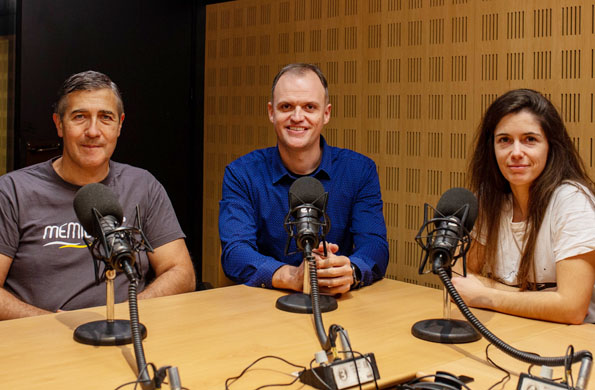New release
''Más claro agua'' brings you closer to the fascinating marine world in the UPV podcast
[ 02/04/2025 ]
'Más claro agua' is a podcast that arises from the initiative of the Eucrante Association in collaboration with the Sound Laboratory of the Gandia campus, Universitat Politècnica de València. Its objective is to answer any questions that may arise about the marine ecosystem. They will talk about fishing systems, cephalopods, marine reptiles, sea snow and oceanic posidonia, among other topics.
The Gandia campus offers a Bachelor's Degree in Environmental Sciences, a Bachelor's Degree in Audiovisual Communication, which promotes the Sound Laboratory, and, at the postgraduate level, a Master's Degree in Environmental Assessment and Monitoring of Marine and Coastal Ecosystems. In addition, the port of Gandia is home to the Technology Unit for Marine Studies of the Spanish Institute of Oceanography. Synergies have led to the creation of the podcast' Más claro agua' in which students also participate.
Miguel Rodilla and Blanca Feliu direct this new programme, with Raúl Terol as executive producer and presenter. Miguel Rodilla is a professor in the Bachelor's Degree in Environmental Sciences and also in the Master's Degree in Environmental Assessment and Monitoring of Marine and Coastal Ecosystems (MEMIC) at the UPV. He is also president of the Eucrante Association and a researcher at the Research Institute for Integrated Management of Coastal Areas. Blanca Feliu is a technical research staff member at the Spanish Institute of Oceanography. Raúl Terol is a lecturer on the Bachelor's Degree in Audiovisual Communication at the Gandia campus.
Eight episodes
The first season of ‘Más claro agua’ has eight episodes that will be broadcast every two weeks from 2 April. In this way, you will learn about everything from marine biodiversity to environmental challenges, guided by experts who will reveal the secrets of the ocean. They will focus on marine reptiles, cephalopods, sea snow (in two instalments), the challenges of the fishing industry, oceanic Posidonia, aquaculture and a final instalment dedicated to children and their vision of the marine world.
Eucrante Association
Eucrante is a non-profit association set up in 2018, initially bringing together Academic Staff and students from the Gandia campus, Universitat Politècnica de València, who shared common interests. Among its objectives is to convey, through environmental education, respect and love for the sea. It is concerned with the conservation and study of the marine environment. Eucrante is open to the entire society, which can participate by becoming a member, making a one-off donation or volunteering.
You can listen to ‘Más claro agua' on the UPV podcast and other platforms such as Ivoox and Spotify. Join us on this sound adventure to explore and better understand underwater life!
Carmen Revillo Rubio/ UPV Communication Area. Photograph: Álvaro Sanmartín Dasí
Outstanding news
 The Diamond Army
The Diamond Army
Two students came up with the UPV initiative that has engaged more than 1,600 volunteers and shattered the false myth of the 'crystal generation'
 ARWU 2024
ARWU 2024
The Shanghai ranking reaffirms the UPV as the best polytechnic in Spain for yet another year
 Distinction of the Generalitat for Scientific Merit
Distinction of the Generalitat for Scientific Merit
Guanter has been distinguished in recognition of his research excellence in the development of satellite methods for environmental applications
 The new statutes come into force
The new statutes come into force
The Universitat Politècnica de València is the first university in Spain with statutes adapted to the new LOSU
 NanoNIR project against breast cancer
NanoNIR project against breast cancer
UPV Researcher Carla Arnau del Valle receives an EU Marie Curie grant to develop biosensors for the early detection of this cancer
 Large artificial intelligence language models, increasingly unreliable
Large artificial intelligence language models, increasingly unreliable
According to a study by the Universitat Politècnica de València, ValgrAI and the University of Cambridge, published in the journal Nature





